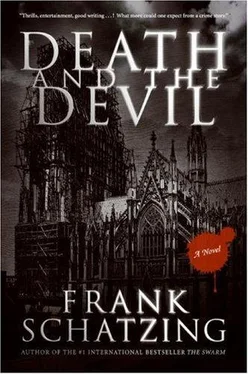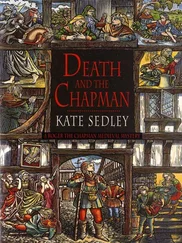“A chat?” Rolof echoed with a skeptical look.
“Why not? I’ve heard there have been all sorts of goings-on in Cologne. I haven’t been able to get the exact details, unfortunately, but someone did say the architect in charge of the cathedral fell to his death. Is that true?”
Rolof stared at him and then at the fire. “Yes,” he replied.
“How dreadful. Such great plans and then this!” The stranger shook his head. “But the ways of the Lord are unfathomable. How did it happen?”
Rolof slumped back on the bench. A cozy chat was beyond him. That Gerhard had not fallen but had been pushed, that much he had understood; also that something terrible was going to happen. Strange, the way he’d heard himself say someone else was going to be murdered. That had exhausted him and he hadn’t said anything else. But what should he say now?
The stranger leaned forward and gave him an encouraging nod. “Speak, my son. It would do my heart good to hear you, even if what you have to say will also sadden it. I did hear”—he looked around then, coming closer and lowering his voice as if there were someone else in the room—“not everyone agrees about the way he came to die.”
“It was the Devil,” Rolof blurted out.
“Aha! The Devil. Who says that?”
“The—” Rolof halted. “The man,” he said cautiously.
“Which man?”
“Who was here.”
“Oh, him. I see. The redhead, you mean?”
Rolof looked at the stranger, racking his brains as to what he should say. If only Jaspar would come back. Slowly, his lips pressed tightly together, he nodded.
The stranger seemed very satisfied. “I thought so. I know that redhead. A very fertile imagination he’s got. A liar, did you know that? Who did he tell all this nonsense to, my dear—what was your name?”
“Rolof.”
“My dear Rolof, the Lord looks down on you and sees a devout servant. But the Lord looks down in anger on those who out of vanity would slander others. Unburden your heart and tell me what this redhead—is his name not Jacob? Jacob the Fox he calls himself in his presumptuous pride, as if he were cunning and wise—said to you about poor Gerhard Morart.”
“Yes, well—” Rolof shifted uneasily on the bench. “Came yesterday, yes? Just Jaspar and Goddert here, drinking as usual. And Richmodis. She’s sweet.” Rolof gave an ecstatic smile. “Nose like a tree in the wind.”
“Beautifully put, my friend. I hope it’s a compliment to the young lady.”
“Richmodis’s sweet. The redhead told us some strange things. Don’t know if I should—” He bit his lip and was silent. Keep your stupid trap shut, Rolof, he told himself.
The stranger was no longer smiling. “Who else did he tell?”
“Else?”
“Who else? Apart from those you’ve told me about?”
“Don’t know.”
“When is Jaspar coming back?”
“Don’t know.”
“And Jacob? Jacob the Fox?”
“Don’t know.”
The stranger looked at him appraisingly. Then he relaxed and leaned back, a beatific smile on his face. “Is not the world a fine place, Rolof? I think I will have that mug of wine, if you wouldn’t mind. Blessed are they that know nothing.”
“Blessed are they that know nothing,” muttered Rolof glumly.
Their pursuers had obviously split up as well. When Jacob reached the meat stalls and looked around he could see only two. He skidded through the mud and headed for the maze of alleys behind the iron market. That was his only hope of getting away. He knew every nook and cranny there and would have the advantage over the men chasing him.
They were getting closer. It was incredibly cramped. Swearing under his breath, he jumped over a large dog and suddenly came face-to-face with a portly matron who completely filled the gap between the cheese and the vegetable stalls. She regarded him with a baleful gleam in her eye, obviously not intending to budge an inch. Behind him he heard furious barking that ended with a yelp before turning into a whimper. Then he heard the all-too-familiar cry, “Stop, thief! The one in the habit! Don’t let him get away.”
Jacob spun around. The two men and the dog were a tangle of limbs and black paws. The men were just getting up again, pointing at him.
“Thief!” The woman joined in, swung an immense radish, and hit Jacob over the head with it, setting off a magnificent display of stars. He pulled the radish out of her hand, threw it at his pursuers, at the same time performing a neat sidestep, which landed him among piles of yellow cheeses. For a moment he found himself staring into the horrified face of the cheesemonger, then he rolled over and pushed him out of the way.
“Thief!” screeched the woman behind him. “He took my radish. My lovely radish.”
Jacob didn’t wait to see if the two men were plowing through the cheeses after him, he zigzagged between the shiny wares of the ironmongers and into the tangle of narrow streets separating the market from the Rhine. He heard footsteps splatting through the mud behind. They were still on his trail. No point in hiding while they still had him in view. In front the street widened out. He would have to dive off to the left or the right. Then he saw a pile of empty barrels carefully stacked on top of each other, ready to be sent out. Behind them a man was checking them off against a scroll. Jacob dashed around the back of the pile just as his pursuers entered the street, faces twisted with rage.
“Sorry,” said Jacob. He gave the man with the scroll a firm push, sending him, arms flailing and with a despairing yell, staggering against the barrels and dislodging them. With a hollow rumble, the whole stack, at first slowly, then faster and faster, started to roll toward the two men. Jacob saw their eyes open wide with horror, then there was a sickening thud. One was felled immediately, the other was twirled around before he managed to escape back along the alley. Jacob didn’t stop to enjoy the spectacle, but took the opportunity to give them the slip. He dived into Salzgasse and sped along to the fish market.
There he stopped, panting.
Where now? Who were these people chasing him and Jaspar anyway? What had they to do with the man with the long hair? And where was he?
All a mistake. The idea flashed through his mind. They’ve nothing to do with it, nothing at all. A double murder in the bathhouse and two people who’d suddenly turned away. They’d drawn suspicion upon themselves. Maybe people even thought they were the murderers.
Who said the dead men were Justinius von Singen and Andreas von Helmerode? Jaspar had jumped to the wrong conclusion. And ruined their only chance.
“Thief! There he is!”
Or perhaps not? No time to think. One of the two had obviously managed to escape the avalanche of barrels and was running out of Salzgasse toward him. He was pointing at Jacob, but he was looking at something beyond him. Quickly Jacob turned around and saw three more men in similar dress staring at him.
“Curses,” he muttered.
They fanned out to the left and right. He couldn’t go back, and in front the fish stalls were packed close together. He couldn’t get away by running along them, the men were too near.
It had to be fish!
“I don’t like fish.” He moaned. Then, accepting the unavoidable, he dived into the crowd, elbowing people aside and heading straight for the biggest stall, setting off shouts of protest in his wake. The long table, piled high with eels, herring, mackerel, catfish, and crayfish loomed up, a menacing, stinking, slippery nightmare. The men and women behind it, busy selling their wares, stared at him in disbelief as it gradually dawned on them that he had no intention of stopping. Just in time, they dropped the fish they were holding and hastily jumped aside, putting their hands up to protect themselves.
Читать дальше












